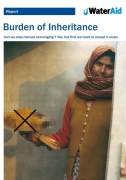Indira Khurana
Rural realities amid second COVID surge
Posted on 17 May, 2021 10:44 PMThe second wave of COVID-19 has now spread to the rural pockets of the country at a much faster rate than it did during the first wave of the outbreak.

Sheroes: A tribute to women who value water
Posted on 22 Mar, 2021 10:19 PMEvery year, March 22 is celebrated as World Water Day. The theme for this year is ‘valuing water’. This indicates the higher level of thinking that is percolating agencies like the UN.

Burden of Inheritance: Can we stop manual scavenging? – A report by WaterAid India
Posted on 19 Apr, 2010 04:28 PM This report by WaterAid outlines how over one million people in the country continue to scrape an existence through manual scavenging, forced largely by social convention and caste prejudice, and calls for strong action to eradicate this practice.
This report by WaterAid outlines how over one million people in the country continue to scrape an existence through manual scavenging, forced largely by social convention and caste prejudice, and calls for strong action to eradicate this practice.
A violation of human rights, this discriminatory and demeaning practice was outlawed by the Indian Parliament in 1993 but still continues today. India has missed three deadlines to make the country 'manual-scavenger free'. India's booming cities help keep the practice alive, as there is often little infrastructure for sanitary sewerage and waste disposal systems.
The report tries to seek answers to why this practice continues despite:
- Availability of other dignified livelihood sources, for the people in this occupation?
- Other cleaner options for survival existing in cities and towns?
- Feasible and viable technological alternatives being available to dry toilets, one of the drivers of this occupation?
Half full, Half empty: A WaterAid publication on the drought and drinking water crisis in Bundelkhand
Posted on 11 Aug, 2009 01:44 PMThis paper on Bundelkhand from their Water and Sanitation Perspective series of WaterAid presents how ecological degradation and faulty policies make drinking water scarce and less accessible.
Right to water and sanitation - A draft paper by WaterAid
Posted on 05 Jun, 2009 11:54 AM"Right to Water and Sanitation", is a briefing paper (draft) written in March 2009, by Indira Khurana and Richard Mahapatra of WaterAid India, based on secondary research.
Issues and approaches for drinking water quality in rural India: a background paper by WaterAid
Posted on 20 May, 2009 11:40 AMThis background paper by WaterAid highlights the challenges involved in achieving clean drinking water supply in rural India.